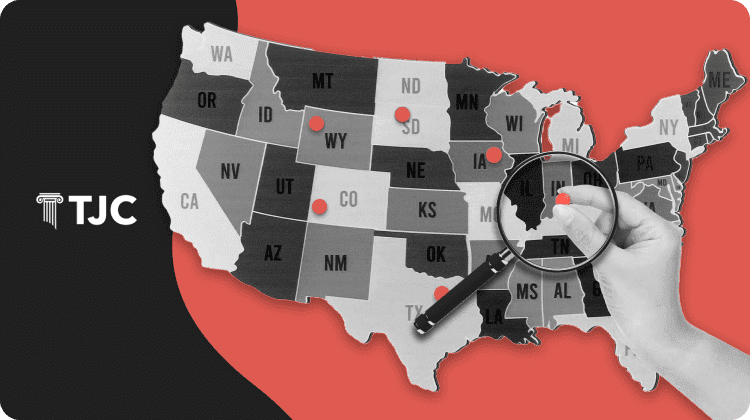What States Prohibit Pending Charges on a Background Check?

When you’re running background checks, knowing the legal ins and outs is important, especially when it comes to pending charges. Different states have their own rules about what can and can’t be included in a background check. This article digs into what states prohibit pending charges on a background check, giving you a simple guide to staying in the know about these regulations.
Need a Background Check?
Get StartedWhat Are Pending Charges?
Pending charges are accusations against someone that are still being reviewed in court. They haven’t yet led to a decision on whether the person is guilty or not. Prosecutors are key players in this process. They review the evidence and decide whether to take the case to trial, negotiate a plea deal, or drop the charges. They must carefully evaluate all the evidence before making a decision.
Common Reasons for Charges Being Pending
Pending charges can happen for the following reasons:
- Ongoing Investigation: Police may still collect evidence or wait for lab results. They might need more witness statements or forensic analysis to strengthen the case.
- Court Delays: The legal system can be slow, with court dates often delayed due to backlog or scheduling issues. Limited court resources and high caseloads can also cause these delays.
- Negotiations: Prosecutors and defense lawyers might be negotiating a plea deal. This process can take time as both sides reach an agreement that avoids a lengthy trial.
- Complex Cases: Some cases involve multiple people or intricate details that take more time to sort out. Cases with extensive evidence or spanning multiple jurisdictions can also take longer to resolve.
The Court Process for Pending Charges
- Dismissal: Charges could be dropped if there’s insufficient evidence or new information clears the accused. This often happens when key evidence is discredited or new witnesses provide testimony that proves the accused’s innocence.
- Additional Charges: Prosecutors might add more charges if new evidence comes up. This can happen if the investigation uncovers further illegal activities related to the initial charge.
- Reduction: Charges might be reduced to lesser offenses as part of a plea deal or because of weak evidence. This often happens when the defense negotiates for a better outcome.
- Following Police Recommendations: Sometimes, the court follows police recommendations, leading to different outcomes based on the situation. Judges often heavily consider law enforcement’s insights and findings when making decisions.
Do Background Checks Show Pending Charges?
Generally, pending charges may be included in criminal history records provided during background checks, but their inclusion depends on state-specific regulations.
In some states, pending charges are reported and visible to those conducting the background check. However ban the box is, other states restrict or prohibit their inclusion to prevent discrimination based on unresolved allegations.
Employers, landlords, and other organizations must know their state laws to avoid getting sued for discriminating wrongly. They should do thorough criminal background checks while following state rules to make fair decisions.
State Laws and Pending Charges
State laws regarding the inclusion of pending charges in background checks vary widely. Some states have clear regulations that either prohibit or allow the inclusion of these charges, while others have more rules that restrict how the information can be used. Knowing these differences is important for employers to remain compliant with local and state background check laws.
States That Prohibit the Inclusion of Pending Charges
Some states have laws that prohibit the inclusion of dismissed records or pending charges in background checks for employment. These states typically restrict employers from using arrest records, which include pending charges:
- Hawaii
- Maine
- Massachusetts
- Michigan
- Montana
- New York
These states generally ban the use of arrest records, covering pending charges and criminal histories.
States That Allow Reporting but Restrict Usage
In some states, pending charges can be mentioned in background checks, but there are limits on how employers can use this information.
- California: Employers can see pending charges on background check reports but must follow to specific regulations regarding their usage.
States With No Restrictions, Barring Discriminatory Use
Certain states do not have specific restrictions about including pending charges in background checks,as long as using the information doesn’t lead to discrimination
- States without Ban the Box law, such as Florida and Texas, may have fewer regulations regarding the use of pending charges in employment decisions.
Employment Background Check Laws on Pending Charges
Laws for employment background checks can differ a lot, both federally and at the state level. Federal laws give a basic structure, and state laws add more detailed rules and limits.
Federal Laws
Federal laws establish the basic rules for background checks and how criminal history information can be used. Employers need to follow these laws to avoid legal issues and make sure their hiring process is fair.
Fair Credit Reporting Act (FCRA)
The FCRA controls how background checks are done and used. It says employers must get permission from job applicants before doing a background check and must give them a copy of the report if it leads to not hiring them. The FCRA wants to make sure criminal history information is accurate and clear.
Title VII of the Civil Rights Act of 1964
Title VII stops employment discrimination based on race, color, religion, sex, or national origin. When using criminal records for hiring, employers must make sure their actions don’t unfairly affect protected groups. They should think about the offense type, how much time has passed, and if it’s relevant to the job.
State Laws
State laws on pending charges in background checks vary, with some states offering more protection to applicants. Employers must be aware of these differences and consult legal counsel to ensure compliance with applicable laws. Understanding state-specific regulations helps employers avoid legal issues and make fair, informed hiring decisions.
Employers should always consult legal counsel to understand the specific regulations in their state. This ensures that they are compliant with all relevant laws. Legal advice is important for maintaining fair and lawful hiring practices.
What to Do if Your Applicant Has a Pending Charge
Discovering that an applicant has a pending charge can be challenging. It’s important to handle it carefully and follow legal rules for a fair hiring process. Here are the steps to take if your applicant has a pending charge.
Verify the Information
- Contact the Court or Law Enforcement Agencies: Reach out to the relevant court or law enforcement agencies to confirm the details of the charge.
- Review the Background Check Report: Make sure the criminal background check includes up-to-date criminal history records and arrest records.
- Cross-Check Information: Verify the information provided in the background check with other sources if possible, to ensure there are no discrepancies.
- Document Your Findings: Keep a record of the information you have verified for future reference and to maintain a transparent hiring process.
Evaluate the Pending Charge to the Position
Once you have verified the information, assess the relevance of the pending charge to the job responsibilities. Consider the following:
- Nature of the Offense: Check how serious and specific the charge is. See if the offense is linked to the job duties.
- Time Elapsed: Consider how much time has passed since the charge was filed. Recent charges might be more concerning than older ones.
- Job Duties: Assess how the pending charge might impact the applicant’s ability to perform the job duties. For example, a financial-related charge might be more relevant for a banking position.
The EEOC (Equal Employment Opportunity Commission) advises private employers on conducting a non-discriminatory assessment. Employers should consider the nature of the offense, the time elapsed, and its relevance to the job. This helps ensure a fair and legally compliant hiring process.
Considering a Background Check?
Enhance Safety and Informed Decision-Making
FAQs
How Far Back Do Background Checks Go?
Background checks usually cover seven to ten years but can vary by state and check type. Some states limit how far back checks can go, while others allow a more detailed review of a person’s criminal history check.
How Far Back Do Criminal Background Checks Go?
Criminal background checks usually cover the past seven years. Some states allow checks to go back indefinitely, especially for certain crimes. It’s important to know state-specific rules about how far back these checks can look.
How Far Back Do Employment Background Checks Go?
Employment background checks usually look back seven years, though some can extend up to ten years or more, depending on the employer’s requirements and state laws. Companies often retain employment records for this duration to comply with legal and regulatory standards.
How Far Back Do Federal Background Checks Go?
Federal background checks often review records going back seven to ten years. However, for positions requiring higher security clearances, the background check might cover a more extended period to ensure a thorough screening of the applicant’s history.
How Far Back Do FBI Background Checks Go?
FBI background checks are thorough and cover a person’s entire criminal history, with no time limit. They include all the criminal convictions and records reported to the FBI, providing a detailed view of a person’s past.
How Far Back Do Fingerprint Background Checks Go?
Fingerprint background checks can go back as far as necessary. They match fingerprints against national databases, providing a complete criminal history. This method ensures that any criminal conviction or record tied to the fingerprints is found, no matter how old it is.
Do Pending Charges Show up on Background Checks in Georgia?
Yes, pending charges can show up on background checks in Georgia. The state allows the reporting of pending charges, which means employers and other entities conducting the full state criminal background check will be able to see any unresolved charges against the individual.
What State Doesn’t Do Background Checks?
All states conduct background checks, but some have stricter regulations on what can be reported. States like California and New York have strict rules on including certain criminal records and the look-back period for background checks.
Do Background Checks Show All States?
Background checks can include records from all states, depending on how thorough the search is and which databases are used. Comprehensive county criminal background checks will usually pull information from national databases, covering criminal records from across the country.
Will Pending Charges Show Up on a Background Check in Texas?
Pending charges may show up on a background check in Texas. The state does not prohibit the inclusion of pending charges in criminal record information, but the use of this information is regulated to prevent discrimination based on unresolved charges. Employers must handle this information carefully to comply with legal standards.
Conclusion
Knowing how background checks work, especially with pending charges, is important. Different federal agencies and states have specific rules about what can be included. This article explained which states prohibit pending charges in background checks, providing useful insights.
Verify any pending charges and see how they relate to the job. Follow EEOC guidelines to keep the hiring process fair and legal. Consider the nature of the offense, how long ago it happened, and the job duties to make informed decisions initial job application.
Stay updated on state laws and consult legal counsel when needed to avoid issues. This approach protects individual rights and helps employers stay compliant. Understanding which states prohibit pending charges in background checks is key to a fair and transparent hiring process.

